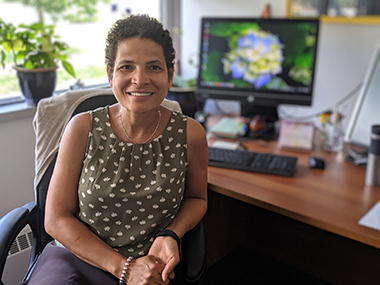Five Questions with Elizabeth Vásquez
 |
|
Photo by Eirinn Marotta
|
Elizabeth Vásquez is an associate professor of epidemiology and biostatistics in the School of Public Health.
What drew you to the field of public health?
I came to public health in a bit of a “back way.” I grew up in the Dominican Republic and went to medical school, though my father always wanted me to be an engineer. Due to political unrest my father migrated to the USA with the goal of bringing us all along. I was the last one of my siblings to migrated to the U.S. in 1991 speaking no English – which funnily I learned by watching PBS and the Price Is Right!
My plan was still to go to medical school, but I wasn’t yet ready to transfer to one here in the U.S. and decided to go to CUNY for gerontology. That’s when I found social work and public health and thought, “WOW! This is so what I want to do!”
I learned that I excelled working with older adults and decided to pursue an MPH at Columbia University, and the next thing I knew, I found epidemiology, which combines my medical training with what my dad knew I always loved – math.
I went on to earn my doctorate, fell in love with teaching, and now I’m here at UAlbany.
What public health issues are you most passionate about?
Aging-in-place and cognitive deficits. I often think about where I want to be when I get old — in my own house!
There’s a lot of research showing that the longer people stay within their community, the better outcomes they will have. Aging is expensive — most people have at least two chronic illnesses as they age and a lot of times, these require regular medical attention. Living in a setting that you’re familiar with helps you function better within the context of your deficits.
However, we have to be prepared to help people age-in-place. When we build homes, we need to think about how residents can stay in those homes and we need to think about resources. For example, my dad, a diabetic, is told to eat healthy food — but he can’t get it in the neighborhood he lives in. We also need to consider how issues impact different cultures — it’s not “one size fits all.”
For me, public health is all about the nuances of prevention.
What's the best part of teaching the next generation of public health practitioners?
It’s rewarding to see when a student really “gets it.” The knowledge is no longer mine, but theirs to use and interpret. I like to hear former students say things like, “I’m still using what I learned in your class.” You plant a seed…and then it grows. It’s up to the student what they do with that seed but knowledge is never wasted. As my dad always said, “the only thing I can give you is knowledge… you have to figure out the rest.”
What was the last book you read for pleasure?
The last book I read for fun earlier this year was Hidden Figures by Margot Lee Shetterly. This book was fascinating to me because it captured so many decades of political and social changes for women interested in research.
What’s one thing students might be surprised to know about you?
Motorcycles and 18-wheeler trucks fascinate me. My dream after I retire is to buy a motorcycle (a retro Harley-Davidson!) and a truck to travel all around the U.S. delivering fresh fruits and vegetables to communities of older adults in need. It will be like a "senior veggie mobile."
![]() For more news, subscribe to UAlbany's RSS headline feeds
For more news, subscribe to UAlbany's RSS headline feeds
A comprehensive public research university, the University at Albany-SUNY offers more than 120 undergraduate majors and minors and 125 master's, doctoral and graduate certificate programs. UAlbany is a leader among all New York State colleges and universities in such diverse fields as atmospheric and environmental sciences, business, education, public health,health sciences, criminal justice, emergency preparedness, engineering and applied sciences, informatics, public administration, social welfare and sociology, taught by an extensive roster of faculty experts. It also offers expanded academic and research opportunities for students through an affiliation with Albany Law School. With a curriculum enhanced by 600 study-abroad opportunities, UAlbany launches great careers.


